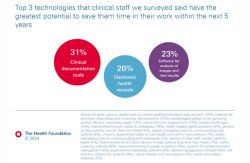The year 2024 unfolds against a backdrop of seismic shifts, characterized by geopolitical upheaval and the relentless impact of climate change. This year marks a pivotal moment, with elections slated in 40 countries, collectively representing nearly half of the world's population. These political transitions ripple through various sectors, from financial markets to healthcare, which is emerging from the shadows of a global pandemic. In a recent interview, Reenita Das, Senior Vice President at Frost & Sullivan, outlined the landscape of change awaiting the healthcare industry in 2024. She highlighted the interplay between geopolitical volatility, environmental concerns, and their repercussions on stock markets, interest rates, and product costs. Increased inflation and cost of living will inevitably affect healthcare accessibility and affordability worldwide.
Healthcare pathways are evolving
Reflecting on the evolving healthcare landscape in the Gulf Cooperation Council (GCC) countries, Das underscored a fundamental shift from traditional brick-and-mortar healthcare models towards a more fluid, patient-centric paradigm. Gone are the rigid classifications of hospitals based on size or ownership; instead, a new era dawns where healthcare facilities are delineated by their virtual or physical presence, their purpose, and their integration into patient-centric care pathways. The future of healthcare delivery, as envisioned by Das, is a continuum spanning primary care in retail clinics, long-term skilled care at home, acute care in hospitals, and ubiquitous virtual care services. Emphasising the transformative potential of virtual care, she predicted its burgeoning prominence, projected to encompass 50% of all healthcare services globally, with even greater adoption anticipated in the GCC region.
Technology advances and digital transformation are trending
The proliferation of Internet of Medical Things (IoMT) technologies heralds a new era of remote patient monitoring and telemedicine, bridging the chasm between hospital-based care and home-based management. With IoMT devices enabling real-time data transmission and analysis, healthcare providers can deliver personalised interventions while empowering patients to actively engage in their care journey. As healthcare institutions embrace digital transformation, the trajectory towards smart and intelligent hospitals gains momentum. Institutions across Saudi Arabia and the UAE are spearheading initiatives to leverage robotics, clinical optimisation algorithms, and data-driven infrastructure planning to enhance operational efficiency and clinical outcomes. Beyond the realm of healthcare delivery, 2024 witnesses the ascent of intelligent assistants, poised to revolutionise human-machine interactions and augment clinical decision-making processes. This paradigm shift underscores the imperative for continuous education and training to equip healthcare professionals with the requisite skills to navigate this evolving landscape.
Sustainability, AI, virtual reality: new trends to monitor
Against the backdrop of COP28 and mounting environmental concerns, sustainability emerges as a cornerstone of healthcare strategy. With the healthcare sector's substantial environmental footprint, organisations are compelled to chart a course towards sustainable operations to mitigate ecological impact and safeguard public health. Ethical considerations surrounding artificial intelligence (AI) loom large on the healthcare horizon, necessitating a harmonised global approach to navigate the ethical and legislative labyrinth. As AI permeates clinical workflows, robust frameworks are essential to safeguard patient privacy, mitigate bias, and uphold ethical standards. The fusion of augmented reality (AR) and 3D printing heralds a paradigm shift in medical education, procedural training, and patient care, offering immersive learning experiences and personalised interventions. Moreover, the advent of precision medicine catalyses a revolution in healthcare delivery, transcending traditional pharmaceutical interventions to encompass personalised diagnostics, therapeutics, and wellness strategies.
2024 appears as a transformative juncture in the annals of healthcare, underscored by seismic shifts in delivery models, technological innovations, and ethical imperatives. Navigating this dynamic landscape demands agility, foresight, and a steadfast commitment to advancing the principles of equity, sustainability, and patient-centric care. As stakeholders chart a course towards a future-ready healthcare ecosystem, the promise of improved outcomes and enhanced quality of life beckons on the horizon.
Source: Omnia Health
Image Credit: iStock
























